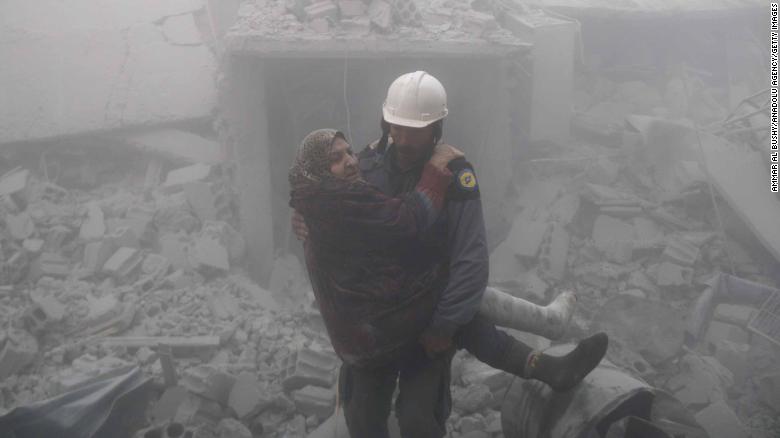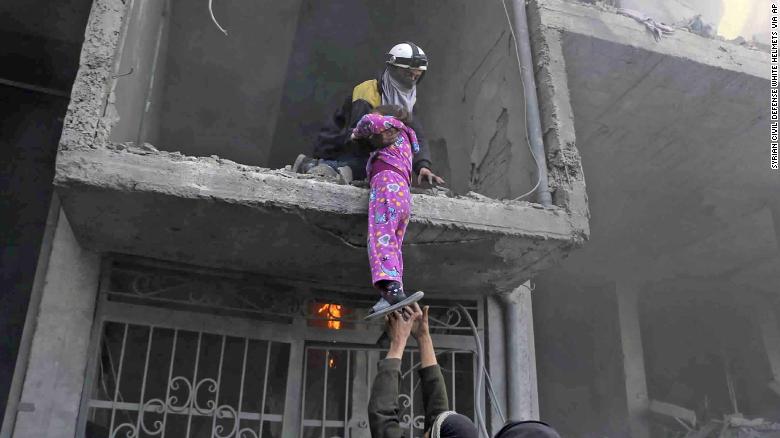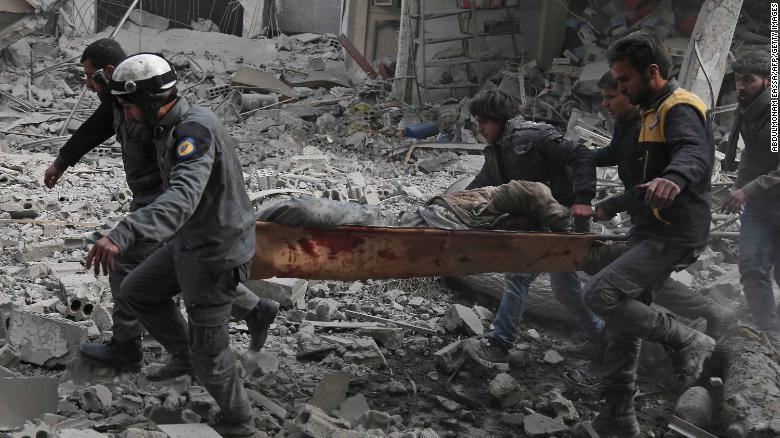The devastation wrought in Eastern Ghouta by a relentless bombardment by the Syrian regime has forced doctors to use expired drugs and scramble for water as the number of dead reached 300 in three days, medics and activists said.
At least 260 people were killed and 500 injured in the rebel held-enclave between Monday and Tuesday evening, the Syrian American Medical Society (SAMS), said. Activists with the Damascus Media Center activist group said another 45 deaths had been reported on Wednesday.
The intensified bombardment of Eastern Ghouta, an area outside Damascus that has been besieged by the regime of Bashar al-Assad for years, drew international condemnation. Amnesty International said "flagrant war crimes" were being committed on an "epic scale" there, and the UN children's agency UNICEF published a symbolic blank statement, saying in a footnote there were "no words" to describe the suffering of children.
UN Secretary-General Antonio Guterres described it as "hell on Earth."
The onslaught has prompted warnings that the Assad regime, which is backed by the Russian military, is preparing to crush the rebel-held enclave.
In a statement condemning the attacks, the White House singled out Russia's support for the Syrian regime. "Assad and his deplorable regime must stop committing additional atrocities and must not be further abetted by backers in Moscow and Tehran," it said.
The Russian military conceded that conditions on the ground were a "critical humanitarian" situation but claimed talks to resolve the conflict had been "derailed."
Syria says it is targeting terrorist groups in the area and Moscow said "illegal armed formations" had ignored calls "to stop fighting and lay down their arms." It claimed they were preventing civilians from leaving the conflict zone.
400,000 trapped
Nearly 400,000 people are trapped in Eastern Ghouta, many of them in desperate need of humanitarian aid, according to the United Nations. Once described as the "breadbasket" for Damascus, Eastern Ghouta is the same area that was the target of an alleged chemical attack in 2013, which activists say killed about 1,400 people.
In recent days, families have retreated to makeshift underground shelters with limited food and water as they try to shelter from the intense bombardment.
Options are increasingly limited for those injured as the bombs, rockets and shells rain down. Twenty medical facilities have been targeted since Monday, according to SAMS, some of them with crude barrel bombs. Of those facilities, four were completely destroyed and two have temporarily suspended their activities. SAMS lost three of its health workers in the strikes, it said.
He described a desperate situation where doctors were using expired drugs, including anesthetics, because they had no other option. Equipment in operating theaters and intensive care units is out of date and there are only about 105 doctors to care for all those trapped in Eastern Ghouta, he said.
Asked about basic services and goods, Aslan said: "Water and electricity that we used to get from the Syrian side have not seen it in seven years. If we are lucky, we get water from natural aquifers and other water wells. As for electricity, we depend on generators and fuel." These are now almost impossible to find, he added.
"These are the worst days of our lives in Ghouta," Eastern Ghouta hospital director and pediatrician Amani Ballour told CNN on Tuesday.
"We in Ghouta have been getting hit by airstrikes for more than five years and this is not new to us ... but we have never seen anything like this escalation."
Rebels fire into Damascus
Rebels have responded by firing into Damascus. Syrian state news agency SANA said two people were injured on Wednesday when armed groups fired two mortar shells on Bab al-Salam neighborhood in Old Damascus.
At least 13 people were killed and 77 others were wounded a day earlier when 114 rockets and mortar rounds landed on several neighborhoods in Damascus. The Syrian army responded to those attacks with "precise strikes," SANA said, destroying rocket launchers and fortified positions used by the armed groups.
Eastern Ghouta is meant to be one of the so-called "de-escalation zones" agreed to in a deal struck by Russia, Turkey and Iran last year. In theory, such zones, also referred to as nonconflict or safe zones, are meant to be areas where civilians can live without being targeted by any party in Syria's war.
Nonetheless, since November, hundreds of civilians have been killed or injured in airstrikes and shelling across the country, according to the United Nations.
The International committee of the Red Cross called for "restraint and access to the wounded" in Eastern Ghouta.
"The fighting appears likely to cause much more suffering in the days and weeks ahead, and our teams need to be allowed to enter Eastern Ghouta to aid the wounded," said Marianne Gasser, head of the ICRC delegation in Syria.
There are not enough medical supplies to cope with the number of injured, the ICRC said, especially after reported hits on medical facilities.
"Wounded victims are dying only because they cannot be treated in time. In some areas of Ghouta, entire families have no safe place to go," Gasser said. "On the other side of the front line, people in Damascus are in constant fear that their children will be hit by falling mortars. This is madness and it has to stop. Civilians must not be targeted."
A UN and Syrian Arab Red Crescent aid convoy arrived in Eastern Ghouta last Wednesday. It was the first convoy to enter the area since November, Reuters reported.
UN chief urges halt to war
UN Secretary-General Guterres called for an immediate halt to hostilities in Eastern Ghouta.
"My appeal to all those involved Is for an immediate suspension of all war activities in Eastern Ghouta, allowing for humanitarian aid to reach all those in need," Guterres said, adding, "I believe Eastern Ghouta cannot wait. "
US State Department spokeswoman Heather Nauert said Tuesday that the United States was "deeply concerned" by worsening violence in Eastern Ghouta, which has targeted hospitals and civilian infrastructure.
Nauert criticized the Assad regime, as well as its backers in Moscow. Russia, she said, "must end its support for the Assad regime and its allies," and shares responsibility for the ongoing violence.
UK Prime Minster Theresa May said she was appalled by the escalation of airstrikes in Eastern Ghouta and concerned by reports of "ongoing deliberate targeting of civilians and civilian infrastructures."
Calling for the violence to cease, she said: "It's not just about the Syrian government, it's about the backers of the Syrian government as well, and we call on all their backers, including Russia, to ensure that this violence stops and that those people who are in need of help are given that help."
Asked by reporters about claims that Russia is partially to blame for the deaths of hundreds of civilians in Eastern Ghouta, Kremlin spokesman Dmitry Peskov referred any questions to the Russian Defense Ministry.
"These are unsubstantiated accusations. It is unclear what they are based on, no specific information was given, and this is how we assess such accusations [based on specific information]," Peskov said. "We do not agree with these accusations."









No comments:
Post a Comment